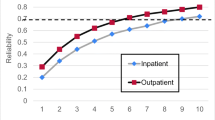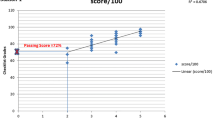Abstract
Objective
Universally, clerkship grading is diverse and not standardized. The authors’ faculty was troubled by the inability to provide meaningful evaluations, as more than 60% of students received the highest grade. Although a psychiatry clerkship mandate of a faculty-observed student clinical interview existed for several years, the majority of students reported not completing the interview under direct observation by a faculty member and no meaningful feedback or evaluation for this activity existed. In order to create diversity in grading criteria and to examine clinical skills more thoroughly than previously, written and oral examinations were developed and supervised interviews of patients and written comprehensive psychiatric evaluations were added. A core group of department faculty was instructed in the use of materials and instruments designed to standardize the experiences and the student evaluations.
Results
Adding a wider diversity of experiences and evaluations to the clerkship, particularly assessment of interviewing skills, oral exams, and evaluation of comprehensive histories, has resulted in a more divergent spread of grades.
Conclusion
Clerkship grades can be effectively computed using various methods to examine knowledge and clinical skills. The addition of new methods of evaluation has added specificity to the performance feedback provided to the students completing the psychiatric clerkship. These changes have been viewed positively by department faculty and medical students. While requiring further refinement, they may eventually provide data to identify students requiring special attention in specific cognitive, relational and clinical skill areas.
Similar content being viewed by others
References
Speer AJ, Solomon DJ, Fincher RME: Grade inflation in internal medicine clerkships. Teach Learn Med 2000; 12(3): 112–116
Rosenthal RH, Levine RE, Carlson DL, et al: The “Shrinking” Clerkship: Characteristics and Length of Clerkships in Psychiatry Undergraduate Education. Acad Psychiatry 2005; 29: 47–51
Levine RE, Carlson DI, Rosenthal RH, et al: Usage of the National Board of Medical Examiners Subject Test in Psychiatry by U.S. and Canadian Clerkships. Acad Psychiatry 2005; 29: 52–57
Simon SR, Pan RJD, Sullivan AM, et al: Views of managed care. A survey of students, residents, faculty, and deans at medical schools in the United States. NEJM 1999; 340(12): 928–936
Zakowski LJ, Seibert C, Van Eyck S, et al: Can specialists and generalists teach clinical skills to second-year medical students with equal effectiveness? Acad Med 2002; 77(10): 1030–1033
Holmboe ES: Faculty and the Observation of Trainees’ Clinical Skills: Problems and Opportunities. Academic Medicine 2004; 79: 16–22
Schwartz RW, Donnelly MB, Sloan DA, et al: The relationship between faculty ward evaluations, OSCE and ABSITE as measures of surgical intern performance. J Surg Res 1994; 57: 613–618
Noel GL, Herbers JE, Caplow MP, et al: How well do internal medicine faculty members evaluate the clinical skills of residents? Ann Intern Med 1992; 117: 757–765
Kalet A, Earp JA, Kowlowitz V: How well do faculty evaluate the interviewing skills of medical students? J Gen Intern Med. 1992; 97: 179–184
Levine R, O’Boyle M, Haidet P, et al: Transforming a Clinical Clerkship with Team Learning. Teaching and Learning in Medicine 2004; 16(3): 270–275
Levinson W, Roter DL, Mullooly JP, et al: Physician-patient communication: The relationship with malpractice claims among primary care physicians and surgeons. JAMA 1997; 277: 553–559
Bondage G: Why did I miss the diagnosis? Some cognitive explanations and educational implications. Acad Med 1999; 74 (10 suppl): S138–S143
Kirch W, Schafit C: Misdiagnosis at a university hospital in four medical areas. Report on 400 cases. Medicine 1996; 75: 29–40
Sierles FS, Daghestani A, Weiner CL, et al: Psychometric properties of ABPN-style oral examinations administered jointly by two psychiatry residency programs. Acad Psychiatry 2001; 25(4): 214–222
Leichner P, Sisler GC, Harper D: The clinical oral examination in psychiatry: association between subscoring and global marks’. Can J Psychiatry 1986; 31: 750–751
Author information
Authors and Affiliations
Corresponding author
Additional information
The authors thank Dean Parmelee, M.D., the Associate Dean for Academic Affairs in the Boonshoft School of Medicine at Wright State University, and Jerald Kay, M.D., the Chair of the Department of Psychiatry at Wright State University Boonshoft School of Medicine, for support and assistance in the medical student educational program and to Brenda Ullery administrative assistant for all her work in coordinating the OSCE videos and the supervised interviews.
Rights and permissions
About this article
Cite this article
Roman, B.J.B., Trevino, J. An Approach to Address Grade Inflation in a Psychiatry Clerkship. Acad Psychiatry 30, 110–115 (2006). https://doi.org/10.1176/appi.ap.30.2.110
Received:
Revised:
Accepted:
Published:
Issue Date:
DOI: https://doi.org/10.1176/appi.ap.30.2.110




